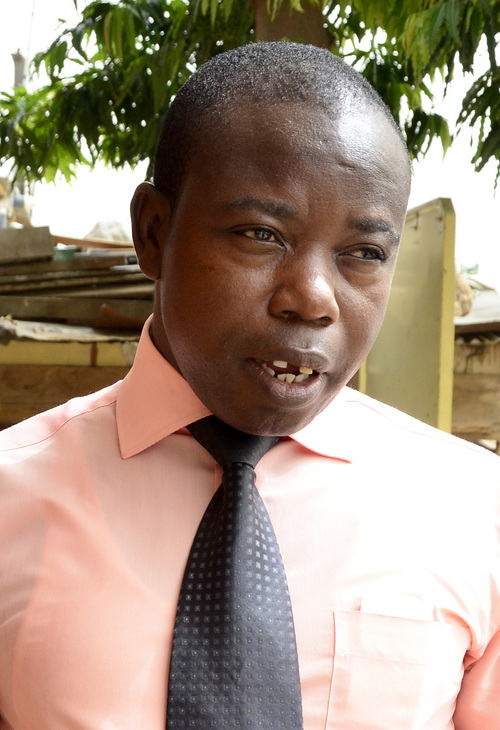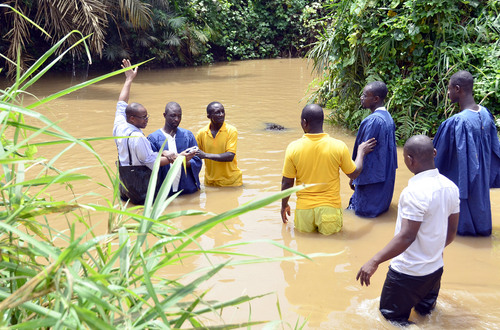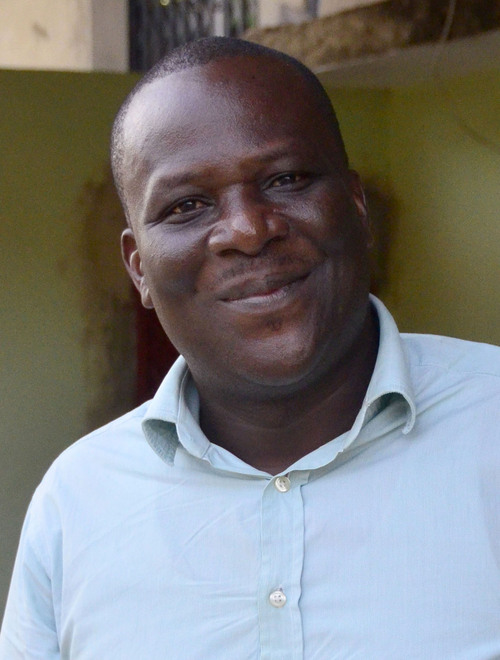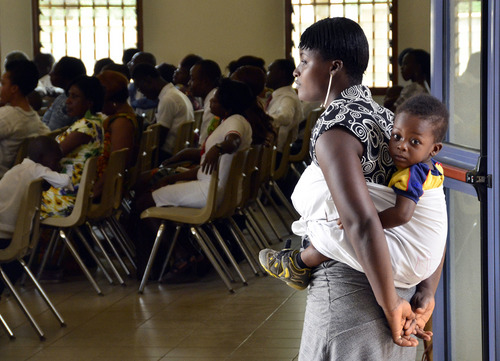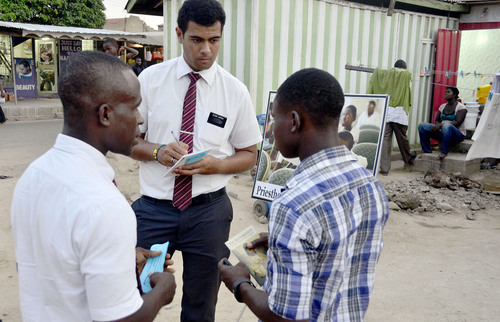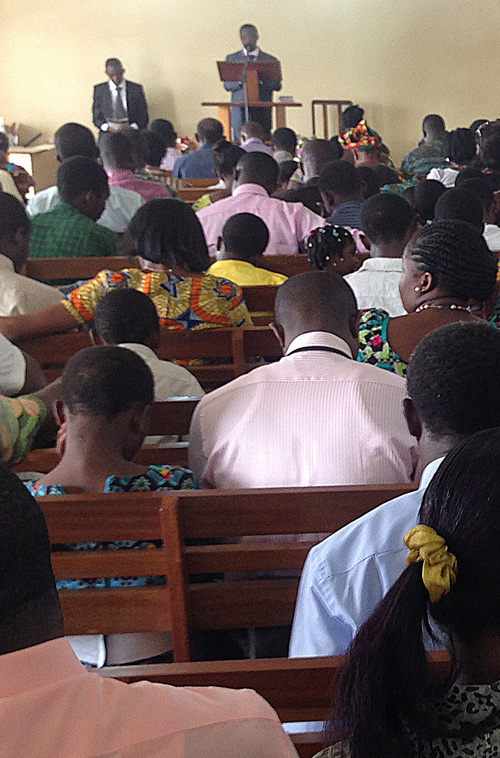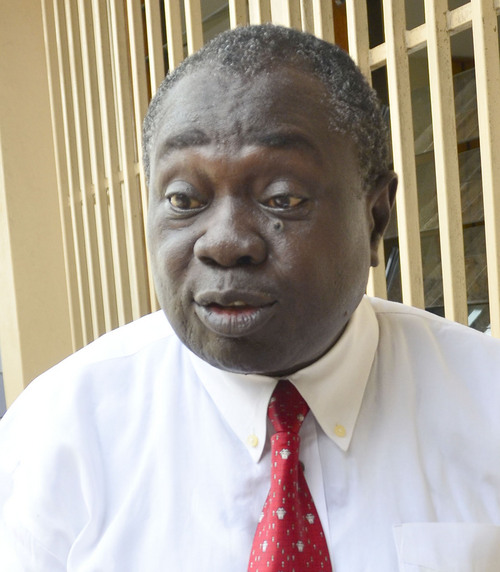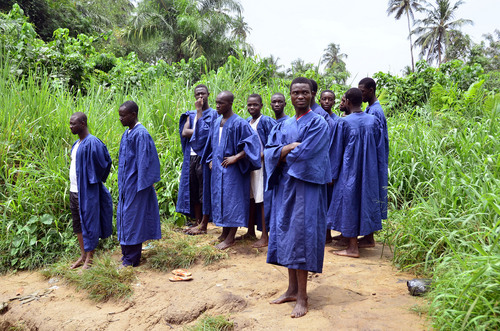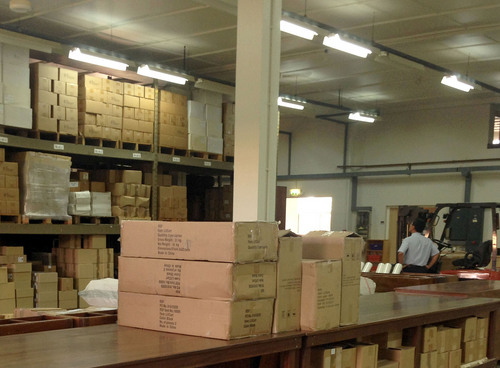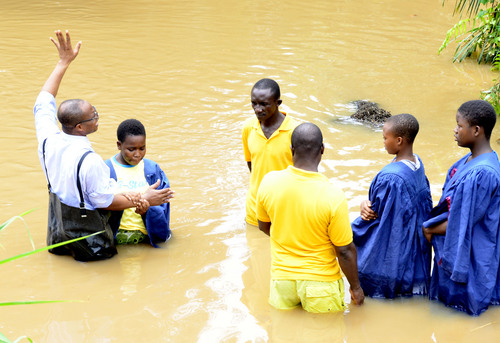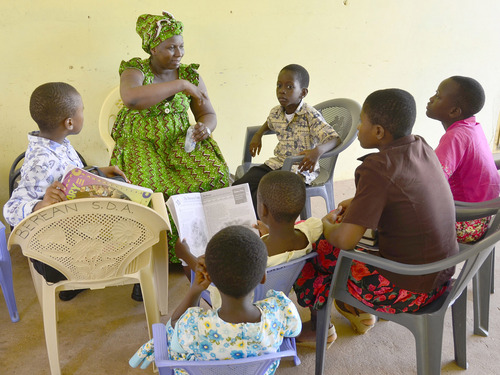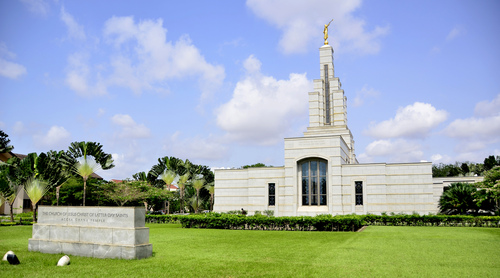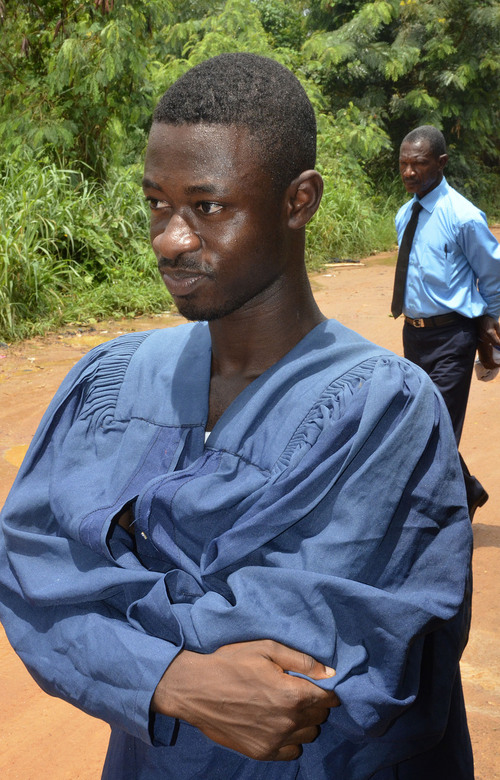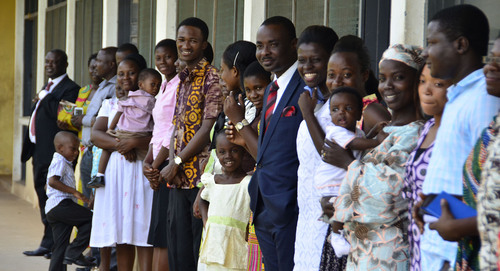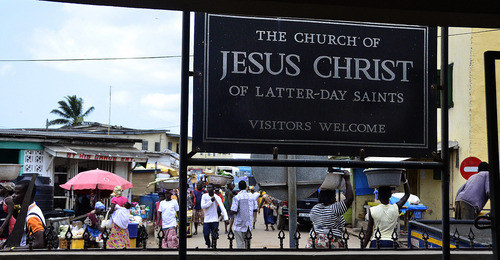This is an archived article that was published on sltrib.com in 2014, and information in the article may be outdated. It is provided only for personal research purposes and may not be reprinted.
Accra, Ghana • Evidence of Christianity's hold on this West African nation is everywhere — from Jesus Furniture Works and Rock of Ages Hair Salon to With God All Things Are Possible Fashion Designs and slogans such as "trust and obey" or "God never fails" painted on taxi windows.
It's on the towering cross over Christ the King Catholic Church and in the sounds of religious exuberance blaring into the streets nearly every morning and evening. Believers pour into storefront sanctuaries to worship with New Heaven Prosperity Ministry, Power of Faith Worldwide and even the Ghana Police Church.
Thrown into this eclectic mix are three American-born versions of the ancient faith — Mormonism, Jehovah's Witnesses and Seventh-day Adventism — each claiming to strip away centuries of tradition to practice a purer, more Bible-based brand of Christianity.
All three faiths emerged in the 19th century at a time of religious upheaval and fervent millennial anticipation in the eastern U.S. — each preaching a coming apocalypse and the return of Jesus in the flesh. All three exist outside the boundaries of historic Christianity, though Adventists, with their paid clergy and Protestant-like organization, come closest to it.
They have found ways and means to explain Christ's delayed return, and developed tools for surviving into and beyond the 21st century — and in settings far from where they began. All have zealous missionary efforts, attracting followers to distinctive brands of Christian worship, beliefs and practices. They baptize by immersion and eschew alcohol and tobacco.
Of course, each insists its own version is the "one and only true church."
Meanwhile,other Christians and observers can see that these three denominations quietly are growing in number, visibility and influence across Africa — and particularly in Ghana.
These days, you can see neatly dressed Witnesses going house to house, clutching their Bibles on the red dirt roads of Accra. Then there are pairs of young Mormon missionaries — one of whom is often American — in white shirts and dark pants, sweltering on street corners in front of giant posters proclaiming "Families Are Forever." And how about all those well-mannered Adventists, consistently filling their pews on Saturday, while others work or play?
The country not only abides these newcomers, in recent years, it also has welcomed them.
"Every Christian has tactics for winning souls for their church," says Kingsley Darko, an elder with the Ghana-based Church of Pentecost who now lives in Utah.
Witnesses and Mormons, for example, "have time to go out and reach people," Darko says. "I like it."
He doesn't share the Adventists' view of the Sabbath or shunning meat, but he believes that church's emphasis on learning and health has made a positive contribution to the nation.
"Sometimes we have lots of arguments," Darko says, "and then we laugh and disperse."
Everybody, he says, "thinks there is good in other faiths."
- - -
Faith-drenched demographic • Ghana, though economically depressed, is a relatively stable country on the continent, with strong protections for religious freedom in its constitution and no objection to proselytism.
More than 70 percent of Ghanaians are Christians, according to the 2010 census. The largest group, as elsewhere, hails from the Pentecostal or charismatic movement, with 28 percent of the country's 25 million people. Next come mainline Protestants, including Anglicans, at 18.4 percent, followed by Catholics with 13 percent. Muslims make up about 17 percent of the population.
Of the three American-born faiths, the Adventists arrived first — 126 years ago — and boast the biggest membership at nearly 400,000 and 1,243 congregations. They have built 916 schools, 13 hospitals and 12 clinics throughout the country.
Jehovah's Witnesses came in 1924 and have more than 100,000 members — three times that many attend their annual conventions in Ghana — with more than 1,000 congregations. The church could use an additional hundred "kingdom halls," or meetinghouses, because it baptizes an average of 114 people a week, Ghanaian Witnesses say.
Mormons began evangelizing in earnest in 1978 after the Utah-based faith ended its centurylong ban on men of African descent in the church's all-male priesthood (though scores of Ghanaians had read LDS materials and thought they were already members before that).
The Church of Jesus Christ of Latter-day Saints reports more than 57,000 Ghanaians on its rolls, but the number attending is less than 50 percent of that, according to LDS officials there.
Of the three denominations, however, the LDS Church has the grandest, most prestigious headquarters — and the most white Americans involved in its activities.
Its gleaming white temple with gold angel on top looms above Accra's Independence Avenue, across from the Canadian Embassy on one of the most important streets in the capital. Its manicured lawns and gardens spread across many acres, which also hold an apartment building for temple patrons, a distribution center, an office building, an LDS stake center, and, soon, the country's Missionary Training Center.
Mormon chapels are easily identifiable on Accra's architectural landscape, being larger and more Bountiful-like than the smaller structures favored by Adventists and Jehovah's Witnesses.
Seeing the size and style of the LDS buildings, some call Mormonism "the rich church," presuming that it teaches the "prosperity gospel" — that God blesses the righteous with earthly wealth — or gives handouts to new converts.
It doesn't, though that perception persists, thanks to Mormonism's standardized chapels.
Mormonism may be growing the fastest, but Jehovah's Witnesses are more numerous and widespread.
"They are more aggressive about opening new areas," says Matt Martinich, a researcher in Colorado Springs who tracks worldwide growth of these churches. "They send members to a new city where there isn't a Witness presence and give them the commission to start a new church."
Mormons, on the other hand, follow a "centers of strength" strategy. Their missionaries focus on cities where most members live, which sometimes slows the religion's spread to rural regions.
Adventists reach out via large gatherings and a television ministry.
All three denominations are involved in what Carl Raschke describes as "infrastructure evangelism."
"They will go in and build schools and churches and development projects that the people desperately need," says Raschke, a religious studies expert at the University of Denver who has written about Christianity in Africa. "Well-constructed buildings have an element of prestige."
Plus, these faiths tap into long-standing community relationships, extended families and traditions.
"Africans are not as individualistic as we are," he says. "They are tribal in terms of faith preferences."
Growth really depends, he says, on which missionary gets there first.
That would be the Adventists.
- - -
Advent of Adventists • Adventist missionaries arrived in Ghana in 1888, and almost immediately found potential converts, especially in rural areas.
They discovered the Ashanti tribe, which coincidentally believed God was born on Saturday — the Adventists' holy day and most distinctive doctrine.
Now, some 60 percent of Ghanaian Adventists are Ashanti, explains Solace Asafo-Hlordzi, communication director for the denomination's Southern Ghana Union Conference.
All it takes to be baptized is to accept Christ as your personal savior, she says, and to attend a Bible studies class.
Such conversions often happen after one of the faith's "crusades," during which a pastor might gather crowds at an outdoor location and spell out Adventist beliefs every night for two weeks. At the end of his presentation — Adventist clerics in Africa, like Witness elders and Mormon bishops, are always men — onlookers are invited to come forward and declare their Christian awakening.
On a sweltering night in March, dozens of curious seekers gather in Jamestown, a fishing village and former British trading post, for a nightly sermon by pastor Ambrose Waahu.
While they wait on plastic yellow chairs with the words "Good Lord" stamped on the back and chickens running under feet, many line up to get a free "health screening," including height, weight and blood pressure. They listen patiently to an hourlong lecture on osteoporosis — not much of a problem for Africans — from materials produced at church headquarters in Maryland. Music booms from giant speakers held aloft on poles, while onlookers watch a film about Jesus.
Waahu, decked out in a dark suit, preaches in clipped English (which is translated into two tribal languages) about the Sabbath, while his words go up on a big screen.
He begins by condemning those who believe in evolution, saying they think that "everything happens by chance or by accident."
Not so, Waahu says. "God gave us a symbol of his creation every week to remind us — the Sabbath."
At night's end, he asks the crowd: "If it is your decision to commit to Christ, stand up and come forward."
Many do.
Charles Essien, 20, found his faith through a friend and by attending a different crusade.
"I want to die as Christ and be reborn," Essien says as he stands on the banks of a muddy river near Pokuase, an hour or so outside Accra. "God is in the Saturday Sabbath."
He dons a blue choir robe, then joins about 30 other baptismal candidates, who will go under the water at the hands of pastor Richard Daves of Pokuase Seventh-day Adventist Church.
Daves, wearing rubber waders, intones a prayer for each threesome as they come forward for baptism.
"Father God Almighty, people want to enter into a covenant with you. Angels may surround them. Come bless your children. Break every covenant with Satan with your children and set them free," Daves implores. "You volunteer to come to Christ, to renounce a life of sin and worldly vices and to walk with the Lord."
He concludes: "I baptize you in the name of the Father, Son and Holy Spirit. Amen."
Some candidates gag as they come up — overcome either by the spirit of the moment or the dirt-clogged water.
Later candidates cover their face with a towel, just in case.
New members can also be children of current Adventists, who are at least 12, an age the church considers old enough to make an informed decision.
Sixteen-year-old Elizabeth Acquah, whose father is an Adventist pastor, was recently baptized by immersion in a swimming pool (Adventist churches don't have fonts).
"From the first moment, I felt a heavy load lifted from me," the young teen said. "I want to work with God. I want to feel his presence."
For Witnesses, it's about the preaching.
- - -
Witnessing to neighbors • William Brown brought his faith's biblical teachings to Ghana in the early part of the 20th century.
Within a few decades, kingdom halls sprang up in towns and villages throughout the country. Each one has the same rectangular layout, with a stage or speaker's podium at the front, chairs lined up in rows on both sides of a center aisle, and classrooms and a library behind. Each hall is built primarily by those who will use it.
By 1952, the group's materials — written in the United States, printed in England and shipped to Africa — began to be translated into Ghana's tribal languages. Today, the Bible and all the U.S.-produced copies of The Watchtower and Awake! are available in six tribal languages in addition to English.
This is essential for Witnesses' weekly worship, which includes two hours of Bible study, scripture discussion and preaching lessons.
At the Wireless Road Kingdom Hall in Accra, about 150 men and women — along with a few well-behaved children — file into the early Sunday service in English. They greet one another as "brother" and "sister."
Before the proceedings begin, congregants pick up "declaration cards" on the front table, which have spaces to list how many hours of witnessing they gave that month.
The elder in charge that day then offers a prayer addressed to "Jehovah Father."
The congregation sings a hymn, including these words: "We love Jehovah with heart, mind and soul. But since we are sinful, we need self-control."
Dan Charway, the speaker, reads a story from The Watchtower about a plane that crashed when it lost its way.
"Everyone needs a compass," Charway says. "Our conscience is our compass. But conscience has been lost in the modern world; we want to do our own thing."
Many people in the world "are dressing in a shabby or immodest way," he says. "And the world's entertainment gratifies sexual promiscuity. ... People are used to these worldly conditions but Jehovah does not change."
Heads are down. Even children sit quietly as fans whir overhead. People in pews follow along in their Bibles, while drumming and singing from a nearby evangelical church waft in through the windows.
"Brothers, we must align our thoughts and actions with Jehovah," Charway says with little emotion. "A good conscience affects everything."
At the end of the speech, the attendees applaud.
They sing again and begin the next phase: a question-and-answer exercise from The Watchtower.
That is how all Witness services go, says Francis Kwabala, a tour guide at the faith's Ghana headquarters, Bethel House, in Nungua, about a half hour away from Accra.
The campus includes a reception area, kingdom hall, offices and dorms, where more than 300 full-time workers help in the dining room, laundry, auto maintenance and printing facilities. They are considered volunteers, who receive housing, food and a small living allowance.
It fits with the time commitment that the church requires: To be considered a full member, a Witness must blanket neighborhoods for a certain number of hours a week. Those who give 70 hours or more are called "pioneers."
It's not a chore, says William Jyssi, an administrator at the University of Cape Coast near Elmina, a few hours from Accra. "Every Witness is elated to go out to preach. Some go street contacting as early as 6 a.m. We see preaching as a lifesaving work for those we approach. It is a very, very important assignment."
Witness beliefs are straightforward, he says. They come from the Bible.
No politics. No rituals. No liturgy. No holidays. No Trinity. The Lord's Supper only once at the annual convention. Miracles only in Jesus' time. No paid clergy. No blood transfusions, based on biblical statements about avoiding blood.
Just moral living and the command to spread the Good News.
"We don't put pressure on anyone," Jyssi says. "We learn how to respond respectfully."
Not everybody, he says, listened to Jesus, either.
- - -
Latter-day latecomers • Mormons came to West Africa much later, but they have jumped in with typical zeal. They have four missions, with just under 150 missionaries each — in Accra West, for example, the mission has 130 young men and 16 young women (82 of the total are non-Africans).
They also have an employment center, a literacy program, the Perpetual Education Fund (to provide loans to Mormon college students), welfare services and workshops on self-reliance.
No matter how poor, though, the LDS Church expects all to pay a tenth of their income to the faith. There is no collection plate, and no one is paid for their religious duties.
"The LDS community seems to offer concrete, practical assistance to members in need, and I think they're very effective with their missionary and promotional material and messages," says Susanna Morrill, a religious historian at Lewis & Clark College in Portland, Ore. "[Mormonism's] focus on maintaining relationships with dead ancestors and future generations seems to jibe well with the ancestral focus of traditional African religions."
That was among the many attractions for Emmanuel Kissi. The 75-year-old physician converted in 1979 while he was away at a British medical school, then returned to his homeland and "found fragments of the church in Accra and Cape Coast."
In his Ashanti tribe, a lot depends on having a relationship with one's ancestors.
"If you want to be a leader in your clan, you must belong to the right lineage," the doctor says. "Family history and genealogy [as taught in the LDS Church] is in our culture."
It is also easy for Ghanaians to embrace Mormonism's "First Vision" story, in which founder Joseph Smith claimed to see God and Jesus.
"Europeans think Africans are superstitious because believing in the unseen is in our folklore," he says. "It is replete with experiences like Joseph's. When I read his story in my language, the details of his interaction with deity, it is enough for me. God is the same as he was with Abraham and Moses."
Kissi also likes the LDS Church's lay clergy. His bishop is a gardener.
Norman C. Hill, president of the Accra West LDS Mission, sees that as appealing to other Ghanaians.
"In addition to the promptings of the Holy Ghost and the innate gospel message, I believe it is our sense of equality and community that attracts people to the church," Hill writes in an email. "Ghana is still somewhat a stratified society and, by contrast, we have no paid ministry and no apparent distinctions based on education, income or ethnicity. Where else are there white people as missionaries living in ordinary housing and positions of authority held by plumbers (Kaneshie ward and Tantra Hills ward) carpenters (a bishop in the Kasoa stake), farmers (most rural areas), and schoolteachers?"
John A. Koranteng, an area Seventy for Ghana, also found the LDS Church's lay clergy comforting.
"Mormonism offers particular answers about having a direct relationship with God," says Koranteng, who converted nearly 20 years ago. "I like not relying on a pastor but going straight to God."
He also appreciates the emphasis on raising righteous families and that every member has a responsibility to contribute to the Lord's kingdom.
Others are drawn to LDS temple worship, its signature scripture, the Book of Mormon, and teachings about pre- and post-mortal life.
Some prefer Mormonism's, well, more sedate form of worship.
"I went to an evangelical church where they sing all day, clap all day, speak in tongues and stay up all night," says Joseph Larbie, who joined the LDS Church in 1985. "I decided that this was not the way for me."
Would-be converts or new members face an array of challenges, including transportation to Mormon chapels for services and activities, hostility from extended family members, and an unfamiliar style of worship, LDS officials says.
Marriage, such a key component in Mormon lives and beliefs, is made more complicated by the persistence of the traditional practice of a "bride price" or payment to a woman's family — sometimes as high as $10,000 to $20,000 — before a wedding can take place.
Some 60 percent of Ghana's Mormons are young adults, these officials say, and cannot afford to marry because of these expectations amid high unemployment.
Despite such hurdles, many Ghanaians are finding a home in these three faiths. They are stricter, more hierarchical and orderly than many other Christian groups.
They emphasize disciplined living and community building — and they try to stay in touch with those who wander.
"If I am unable to go to services in my church, nobody comes looking for me," says Ernestina Novieto, a lecturer on religion at the University of Ghana. "The fact that they come to my house is very appealing."
Mormons, Jehovah's Witnesses and Seventh-day Adventists are filling in the gaps left by other churches, Novieto says. "Where other faiths have failed, these new faiths take advantage."
Maybe one day, images of the Angel Moroni, clips from The Watchtower and slogans about the Sabbath will pop up on billboards, taxis or hair salons.
pstack@sltrib.com Twitter: @religiongal —
Project support
Tribune reporter Peggy Fletcher Stack and her husband, photographer Michael Stack, traveled to Ghana as fellows for the Washington, D.C.-based International Center for Journalists, whose program to promote global excellence in religion coverage is supported by the Henry Luce Foundation.


